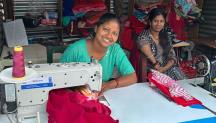

ETAF Can Help Create a Wide Spectrum of Jobs, Says IRENA's Ahmed Badr
Newsletter
An interview with Ahmed Badr, Director of Project Facilitation and Support, the International Renewable Energy Agency (IRENA)
IRENA’s Energy Transition Accelerator Financing platform (ETAF) is a multi-stakeholder climate finance platform, targeting the deployment of 1.5 gigawatts of new renewable power in developing countries by 2030. The platform has a declared goal of securing a minimum of USD 1 billion in funding.
What were the conversations you had with the IRENA Director-General regarding his vision for ETAF?
“I had never met the IRENA Director-General previously, so the first time was during the final round of the interviews for my role at IRENA. But there appeared to be a clear synchronization of our ideas about creating this type of facility. In fact, the IRENA Director-General had already put the idea into an Action Plan presented at his first General Assembly in 2019.”
How does investment support IRENA’s work on the energy transition?
“The main problem the world faces is not to convince the developed or developing countries about the need for renewable energy because of climate change and combatting greenhouse gas emissions. It is actually about finding bankable projects and attracting investors globally, especially in developing countries.
IRENA’s goal with ETAF is to help developing countries and least developed countries take advantage of investment opportunities; this means projects offering a good financial return for the investors together with robust environmental and social good governance and without putting a heavy debt on the countries themselves. One final point, this is exactly what Multilateral Development Banks and investors are looking at, but to do so means dedicating large amounts of resources. IRENA, however, is helping to reduce these transaction costs when supporting less developed countries.”
How does ETAF help people?
“ETAF can help create a wide spectrum of jobs not only in green energy, but also numerous opportunities for both large and SMEs across the value and supply chains. It helps people on all fronts, with security of supply, providing people with warmth and helping them in hotter climates.”




